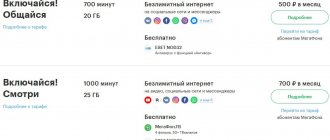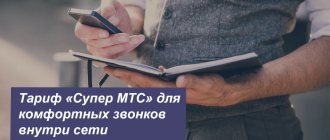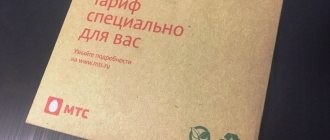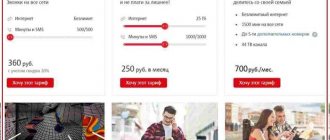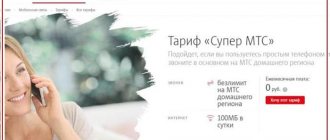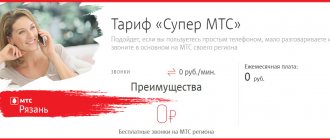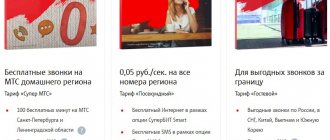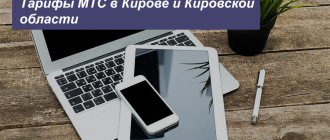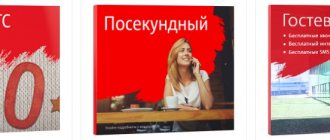Detailed description of the Super MTS tariff Rostov region
Fortunately, the mobile operator has an alternative tariff, which is called “Super MTS”. This offer is absolutely free, that is, the client does not need to make a subscription payment. At the same time, the tariff plan has a number of nuances that you need to know about before connecting.
What is included in the tariff
Like any tariff plan without a subscription fee, Super MTS has only a basic set of services. Unlike other MTS TPs, the client will not receive:
- package of minutes;
- free SMS;
- gigabytes of traffic.
At the same time, this does not mean that the owner of the SIM card will have to pay for absolutely every action performed. In particular, the Super MTS tariff includes free incoming calls, SMS and MMS. The user does not need to pay for these services, as well as for caller ID.
MTS uses a trick by posting a description of the tariff plan. The operator assures that as part of the Super MTS offer, the client will receive free calls within the network and an Internet package, however, the provision of these services is only possible if an additional paid option is connected.
Other communication services on the Super MTS tariff must be paid separately. This applies to both calls and SMS, as well as Internet connection. To expand user capabilities, the operator offers to connect one of the additional options, which will be discussed below.
Peculiarities
The service works only on the Super MTS tariff plan. There are also a number of restrictions that subscribers should be aware of:
- The option does not work in Crimea.
- After the end of the 100 MB package, Internet access is blocked, but it can be extended using the Turbo Button service.
- A new 100 MB traffic package is provided every night at 00:00.
- The service is incompatible with most Internet options (BIT, Internet Mini, etc.), as well as with the “Unlimited Calls” and “Like Home Everywhere” services.
- If the traffic package has not been used up, then the balance will not be transferred to the next day.
- There are no restrictions on the duration of calls to MTS subscribers.
- This option applies to all outgoing calls, including video calls and forwarded calls.
will be of interest to those who communicate a lot with other subscribers of the company. It will significantly reduce communication costs, especially if the phone is not used at all or almost never to access the Internet.
Not included in the tariff and paid separately
The vast majority of services that MTS clients use almost daily are not included in the Super MTS tariff. This means that the subscriber will need to pay additionally. And if there is no money on your balance, you will not be able to make a call or send a message.
The following prices apply to the Super MTS tariff plan:
- calls to MTS in the Rostov region – 0.78 r/min;
- calls from MTS subscribers throughout Russia – 3.7 r/min;
- conversations in the home region with clients of other operators – 1.1 r/min;
- other calls within the country – 12.5 r/min;
- calls to Armenia, Belarus, Kazakhstan, Kyrgyzstan – 36.5 r/min;
- calls to other CIS countries, Georgia, Ukraine, Abkhazia and South Ossetia - 50 r/min;
- calls with subscribers from other countries – 75 r/min;
- sending SMS within Russia – 2.1 rubles;
- cost of MMS messages – 10.3 rubles/pcs;
- outgoing SMS abroad – 8.4 rubles;
- 20 MB of Internet traffic – 26 rubles.
As you can see, prices can only be called low in the case of the home region. Calls to Rostov-on-Don and throughout the Rostov region cost approximately 1 ruble per minute of conversation, and SMS costs a little more than two rubles. At the same time, talking to clients of other operators living in a different region is quite expensive.
Internet fees seem to be a definite drawback. 26 rubles for every 20 megabytes is a lot, so it is recommended to think about activating an additional option if you frequently use access to the global network.
Despite the fact that the Super MTS tariff plan does not imply a subscription fee, for the absence of paid actions within 90 days, a daily commission in the amount of 3.2 rubles will begin to be debited from the personal account.
Additional options for the tariff plan
Since Super MTS offers customers to pay for each action from making a call to accessing the Internet, in order to save money, the operator’s customers are recommended to sign up for one of the additional services. The most popular offer is the “Everything is super” option for 8.4 rubles/day.
It expands the basic capabilities of Super MTS, offering subscribers new and completely free features:
- calls to MTS subscribers in the home region at no additional cost;
- 100 MB of traffic daily.
After using the Internet package, traffic will be paid in accordance with the terms of “Super MTS”, which were described earlier. Thus, it is worth recommending to those who communicate only in their home region and periodically open the Internet to read news. To activate an additional option in the Rostov region, you need to send the command *111*249# or use your personal account.
“Everything is super” is by no means the only service that can be connected additionally to the “Super MTS” tariff plan. In particular, you can activate an Internet package for your tariff:
- 3 GB (190 rubles) – *111*1417*1#;
- 5 GB (250 rubles) – *111*1517*1#;
- 10 GB (300 rubles) – *111*1617*1#.
Activation is a one-time process, and therefore the client will have to activate an additional package every time he wants to access the Internet on more favorable terms. An alternative offer is the “BIT” option, which provides the client with 75 MB of traffic daily for a month. You can spend them at your discretion, and you will have to pay 160 rubles/month to use the service, which is cheaper compared to the “Everything is Super” offer.
In addition, using the command *678#, clients with the “Super MTS” tariff can activate the “Access to YouTube” option for 315 rubles/month, which provides unlimited traffic for watching videos on the popular video hosting site. And for unlimited access to social networks and instant messengers, it is recommended to connect for 4.2 rubles/day using the USSD request *345#. The list of social networks, instant messengers and streaming services that work unlimited is presented below.
If the client is interested in calls and not the Internet, it is worth recommending the option “Russia is at home everywhere.” For 3.2 rubles per day, it offers a single price for outgoing travel in Russia. Instead of 12.5 r/min, a call will cost 3.2 r/min.
The full list of services that are additionally activated on the tariff can be found on the official MTS website in the corresponding section.
Additional Internet services
In addition to the benefits of making calls, the client has the opportunity to activate options aimed at saving money when accessing the Internet. Services that are beneficial for a tariff without Internet from MTS include:
- “Internet mini” , under the terms of which the client receives 7 gigabytes per month for 500 rubles, connection is made by dialing the combination *111*160# and the call key.
- "Bit" . This option is suitable for those clients who rarely use the Internet, but regularly log into social networks to check messages. According to the terms, the user receives 75 megabytes per day for 200 rubles per month. You can connect to the service by dialing *252# and the call key.
- “Internet-maxi” provides subscribers with 15 gigabytes of traffic per day and completely unlimited night time. The monthly payment is 800 rubles. You can activate the option via *111*161*1#.
- “Internet VIP” . Under the terms of providing this option with additional Internet traffic, the client receives 30 gigabytes and full unlimited access to the global network for 1,200 rubles. You must activate the option by entering *111*166*1#.
- "SuperBit". According to the terms of provision, the subscriber is offered 3 gigabytes of traffic for 350 rubles. Activation is performed by entering the following command: *111*628#. There is also the opportunity to visit your personal account and, after successful authorization, enable the selected option to increase Internet traffic.
Who is the Super MTS tariff suitable for?
As has already been repeatedly noted in today’s material, the “Super MTS” tariff plan has a number of nuances that do not allow us to recommend it for connection to absolutely all MTS subscribers. At the same time, this proposal still has its own audience. But first, about all the advantages and disadvantages of the tariff.
Advantages and disadvantages
No subscription fee
Profitable calls in your home region
Possibility to connect additional options
Expensive conversations with subscribers from other regions
Dear Internet
For pensioners who do not use the Internet and mainly call their loved ones, the “Super MTS” tariff is suitable like no other. Also, the offer will be relevant for children if they have not yet started using modern Internet services and make calls only to their parents’ numbers.
In addition, this MTS offer is suitable for all those who rarely use communication services. If you use home Internet via Wi-Fi, and make calls for a total time of no more than 50-60 minutes per month, then Super MTS will not disappoint you. Otherwise, it is recommended to pay attention to another tariff plan rather than activating additional options within “Super MTS”. Because including third-party services is a much less profitable proposition than switching to a plan with a built-in package.
Calls
Before activating a new tariff plan, you need to carefully study all prices for options that can be enabled or disabled at the user’s discretion. The cost is calculated according to the following points:
- The user does not pay for incoming calls.
- You can activate the All Super or All Super + offer to make free calls within the network to mobile and landline numbers of the operator.
- For calls to landline and mobile operator numbers without connection you need to pay 1.9 rubles/minute.
- Making calls to numbers of other operators is paid at the rate of 2.6 rubles per minute.
- Outgoing calls to other regions to numbers within the network will cost 5.8 rubles/minute.
- Calls to other regions of Russia outside the network are charged at a rate of 15 rubles per minute.
Additional Information! Prices are presented for residents of the capital and the Moscow region. Prices may vary in regions.
How to activate the Super MTS tariff in Rostov
Despite a fairly large number of shortcomings in the Super MTS tariff plan, any resident of the Rostov region can connect to it and not worry about extra expenses for communication services. If you are not a current MTS subscriber, then to connect you will need to visit the operator’s official office or submit an application to purchase a SIM card through the official website mts.ru.
You can switch to MTS with a SIM card from any other operator, while maintaining your current number.
Those who are already actively using MTS services are recommended to connect through their personal account on the mts.ru website or in the My MTS mobile application. After authorization, the client will need to open the “Tariffs” section, select the offer of interest and click the “Connect” button.
Switching from another tariff plan will be free if the client last changed their tariff plan at least a month ago. Otherwise, you will have to pay an additional 150 rubles.
The final way to switch to the Super MTS tariff plan involves using the short USSD command *111*8888#. Just enter the specified numbers in the dialer and press the call button, after which the new tariff will be connected.
Activation of the “Everything is super” option on MTS through the contact center and at the operator’s office
If you cannot connect the service using any of the above methods, then ask MTS employees for help. There are different options for accessing them:
- Just call 0890. Follow the voice assistant prompts to quickly contact an operator. After answering, inform the call center employee of your desire to connect. He will ask you to provide some personal information for identification (full name, passport). If you say everything correctly, the operator will activate the option.
- Visit the nearest MTS store, taking your passport with you. Ask the employee to connect. He will provide information about the activation cost and features of the option. After that, it will check your data in the program and activate the service. You will receive a confirmation SMS.
How to disable a tariff plan
With the deactivation of the Super MTS tariff, things are the same as in the case of activating the tariff plan. To disconnect, the client can simply switch to any other tariff plan offered by the cellular operator. The operation is performed in several ways:
- through your personal account on the website mts.ru;
- in the “My MTS” mobile application;
- using the USSD command assigned to each tariff plan separately.
If you do not want to use communication services from MTS in the future, you must visit the operator’s office along with your passport and service agreement. The absence of an agreement will not be an obstacle, but will require additional time to verify documents. But a forgotten passport is exactly what will not allow you to deactivate a SIM card with the Super MTS tariff.
4.6/5 — (21 votes)
Author
Hermann
Expert in the field of digital technologies and the activities of mobile operators. I am engaged in constant monitoring of industry changes in Russia and abroad.
Operators, unusual news
MTS “optimized” prices on most of the popular archival “Super MTS” tariffs, this really affected many. It's unpleasant, but it could have been worse. Mass auto-reset of passwords in Personal Accounts is fraught not only with hassle for subscribers (“Smart Gates” are indignant!), but also with problems for the operator. Can an operator fight the “export” of its SIM cards and tariffs from cheap regions to expensive ones? It seems that there is no way, but, as they say, “there are options!”
MTS, “Super MTS” is no longer super?
MTS has “edited” the once most popular archived “Super MTS” tariffs. In the regions they did this a long time ago (it seems like in the spring of 2021), and now they have reached Moscow. Among the victims are the tariffs “Super MTS 042014”, “Super MTS 122014”, “Super MTS 092014”, “Super MTS. Region 072014", "Super MTS. Region 072015", "Super MTS 0513", "Super MTS 2013", "Super MTS." and "Super MTS 082013".
The main change is that instead of 15-30 completely free minutes a day, they made 0.95 rubles. for the first minute of a call to a local MTS number, from the 2nd to the 15th minute the call is free. Options have also become more expensive, and intercity prices within the network have increased by 0.5 rubles/min. This 0.95 rub. in the first minute they caused the most indignation, how is that possible?! Even at the risk of being buried under a pile of stones from you, I will write that tariffs without a subscription and at the same time with a completely free intranet are still evil. People spent years using Super MTS, answering incoming messages and making calls themselves, even if only for 15-30 minutes a day. At the same time, they often paid nothing to the operator at all, using his resource and services. This, after all, is unfair to other subscribers who “sponsor” such a celebration of life. As Nikolai Nikiforov once wrote when he was Minister of Communications, “because for everything that is free, someone must eventually pay.”
And in general, if you think that this is dishonest (but then it was honest!), then go to Nikolai Valuev to sort it out and angrily call him to account “for the market.” (© photo - computerra.ru)
What will happen
The changes come into force on August 13, 2021; at the time of preparation of the material, the news was not yet on the site. There is a page that lists the changes, which can be found here. SMS distribution with a warning began two weeks before “day X”, and the news may appear on August 3-4, 2021. They did not make a separate SMS text for each tariff; they sent everyone a link to the page with the changes.
See your region and specifically your tariff. To avoid being accused of bias, I took the first tariff from the list on the page with changes (“Super MTS 042014” and “Super MTS 122014”). MTS also added a link to this page in all pdf descriptions of the affected tariffs. Like, even if a person who didn’t receive an SMS heard about the price increase and rushed to look at his archived tariff in the pdf description, he’ll see the link. And you will be informed about price changes. Probably, from the point of view of the law, this is enough, and I have already begun to strongly doubt that the news will appear in the MTS news feed on the website. So, the list of changes:
- When calling a local MTS number and all landline phones in Moscow and the Moscow region, the cost of the 1st minute of conversation will be 95 kopecks, then from the 2nd to the 15th minute the call will be free, and from the 16th minute of the same conversation 95 kopecks per minute.
- The cost of calls to MTS to other regions of Russia will be 5.50 rubles/min.
- The daily fee for the “Call for free to MTS Russia 100” option will be 4.50 rubles.
- The daily fee for the “Call for free to MTS Russia 100 (022015)” option will be 4 rubles.
For the rest of the archived Super MTS tariffs, the numbers differ slightly, and in general the idea should be clear to you. I, according to my already ingrained liver habit, still looked for the positive in this rise in price (objectivity - uber alles!) and finally found this positive. For all callers within the network of their region, now EVERY call within 15 minutes will cost 0.95 rubles. For a ruble per 15-minute call within the network - at least call, I apologize for the tautology. Yes, you need to look at your watch, but those who are accustomed to using exclusively free minutes on Super MTS are already well trained in this science.
Also against the background of the fee is 0.95 rubles. for each conversation, the “100 minutes on MTS Russia” option now looks much more attractive. Even with the option price of 4.5 rubles/day, the tariff without this option is only interesting to those who talk no more than 4 times a day and do not call other regions at all. With the option it turns out to be 137 rubles. per month for 100 minutes a day, for many this is actually unlimited voice. Plus intercity to regional MTS, what's bad? In general, a person by nature is inclined to value what he has lost and what another has, but cannot be obtained for himself.
I read the plaintively nostalgic: “This is the end of an era!” In general, I agree. Indeed, the end of “an entire era” for those who have become accustomed to using mobile communications for free. But all good things, if they are free, come to an end sooner or later.
Passwords in MTS
Since we're talking about MTS. I recently wrote about the epic fail of MTS with mass reset of passwords in the Personal Account, you can read our review here. MTS realized their mistake, realized the scale of the bedlam they had created, and restored the functionality of the previously set passwords on August 2, 1019. Praise be to Allah! And whoever did not wait until this date and rushed to change the password earlier is his own evil Pinocchio. You won’t read about this event, which affected tens of thousands of subscribers, in the news feed on the website. There is news about the rise in price of satellite TV, because it is more important for key clients.
Not all old passwords have been restored to functionality; there are complaints. I sincerely hope that only passwords that did not meet the latest requirements were “killed”: “Latin letters, capital letters, numbers and the blood type number of a virgin sacrificed in 1995 in Africa.” If so, then there was at least some sense in this “federal action” of resetting passwords. On the other hand, if the task was simply to remove passwords like 1234567 from circulation, then why was this “carpet bombing” of everyone carried out? It still doesn’t seem entirely logical that the system allows you to re-enter the old password. Yes, yes, the same one that was reset.
The fact that the passwords have been restored does not necessarily mean that MTS has abandoned this idea completely and the passwords, as before, will live quietly for years. I can assume that the mass reset of passwords greatly complicated the work of the contact center and they decided to “roll back” this matter. Perhaps now passwords will be reset every 180 days, but in relatively small portions.
About the “export” of tariffs from cheap regions
I have already written that the “cancellation” of intranet roaming, even in the current castrated format, will inevitably cause a sharp increase in the popularity of regional tariffs. Moreover, this is not always a “malicious” and purposeful acquisition of a regional SIM card. There are many cases of migration to an expensive region to the place of work (for example), and if earlier a person was forced to change his SIM card to a local one in order not to pay for incoming calls, now he calmly lives with his SIM card of the “old” region, without changing his phone number. At the same time, he pays noticeably less, all the advantages! The only negative is the difficulty of replacing a failed SIM card: not all operators change SIM cards in other regions in their salons, and if they do, it’s not in all salons. A caller to such a number may (and often does) incur a charge for a long-distance call, but the owner of a regional SIM card usually does not care about this. You should have called me, you should pay, it’s not my problem. I even read about the class teacher in a Moscow school with that number, a textbook example of how “the sheriff doesn’t care about the problems of the Indians.”
Operators, naturally, are not happy with this situation, but how to deal with it? At Yota, the issue was resolved a long time ago; after 30 days of being in a “foreign” region, the number is transferred to another (special) tariff. Now MegaFon has come up with its own version. The tariff from the new “Turn On” line is considered and called a “promotion” in the home region, and there is also a “regular” price, which is 1.5-2 times higher than the “promotional” price. The “promotion” is valid when connecting in a salon or purchasing through an online store (i.e., a new subscriber), the “regular” price is valid when switching to a tariff of a new line through self-service systems. Now, after a month of staying in another region, this “promotional” price changes to the “regular” one, and as soon as you return to your region, the “promotional” price starts working again. They posted a description (available in pdf), quote:
“If you are outside the connection region for more than 30 days, participation in the promotion is suspended and an additional daily subscription fee in the amount of 1/30 of the difference between the promotional and regular subscription fees begins to be charged. Participation in the promotion is resumed from the moment of registration in the network of the region of connection.
List of regions in which an additional fee will be introduced for long trips in Russia: Belgorod, Voronezh, Ivanovo, Irkutsk, Kemerovo, Kurgan, Kursk, Lipetsk, Nizhny Novgorod, Omsk, Smolensk, Tomsk, Tula, Tyumen, Chelyabinsk, Yaroslavl regions, Perm Territory , Khanty-Mansi Autonomous Okrug and Yamal-Nenets Autonomous Okrug."
Archived tariffs are not affected yet. They write that not all of the listed regions and not all of the new tariffs have been introduced, but it is a matter of time. They plan to complete the process by August 12. Actually, it's an interesting idea. I wonder if fellow operators will come up with something similar? After all, formally this is not an attempt to “ride around” the abolition of roaming throughout the country, because in ordinary trips such “optimization” of the subscription fee does not work, ride around Russia for your health. If you approach it not formally, but humanly, then you can also understand the operator. To drive prices up to the Moscow level means to lose paying subscribers and income; dropping prices to the level of “poor” regions means a catastrophic drop in ARPU and, again, a loss of income. Such a “tax” on the long stay of a SIM card in another region is at least understandable and logical; it is precisely the fight against the “export” of SIM cards from cheap regions. If the FAS and Roskomnadzor do not have any complaints, then this may turn out to be an important precedent. And what? Declare all domestic tariffs as “promotional” and in case of a long stay of a SIM card in a “foreign” region. At a minimum, the rapidly growing black market for regional SIM cards will “collapse,” and at maximum, we will eventually stop thinking about in which region the SIM card of a taxi driver or a child’s school teacher was originally registered. And don’t write to me about the fact that “all normal people have long had package tariffs with free long-distance intercity included in the package,” while “abnormal” people (and there are many of them) have long-distance intercity tariffs of 13-14 rubles per minute.
